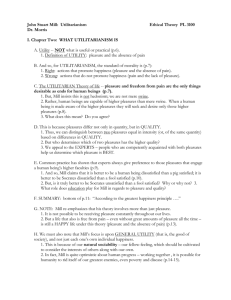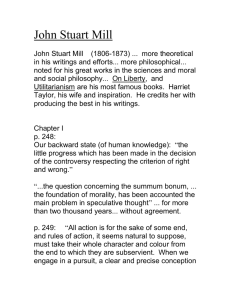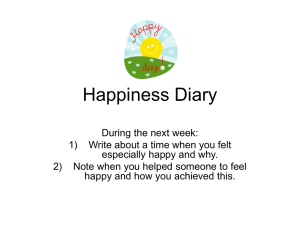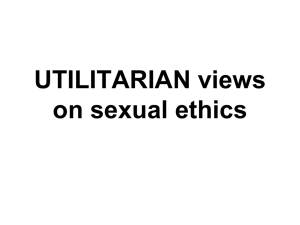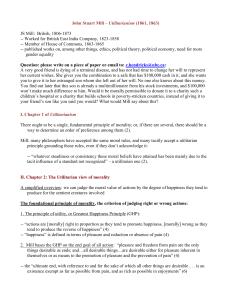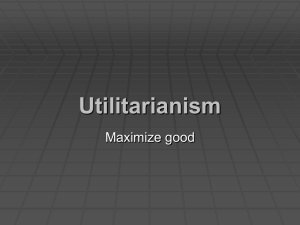Mill's principle of utility
advertisement
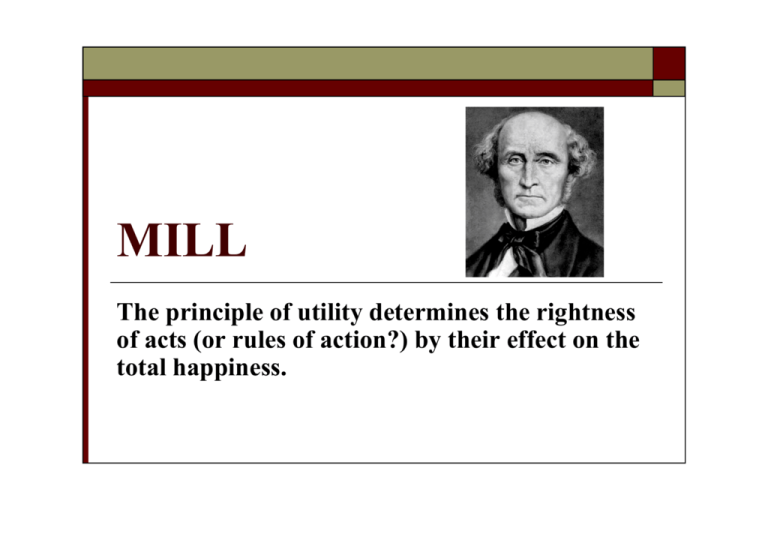
MILL The principle of utility determines the rightness of acts (or rules of action?) by their effect on the total happiness. Mill’s principle of utility Mill’s principle combines theories of the right and the good (utilitarianism and hedonism) that are distinguished in 20th century philosophy: “ [A]ctions are right in proportion as they tend to promote happiness,” with happiness understood roughly as “pleasure and the absence of pain” (p. 55). Its simplest interpretation takes “tend” as referring to actual consequences of specific acts, but it might later be applied to general rules or types of act. Mill identifies the principle with Bentham’s “Greatest Happiness Principle,” understood as referring to total happiness (vs. the number of people made happy) and extending to all sentient beings, at least to some extent. But unlike Bentham, Mill doesn’t take happiness just as a mathematical sum of pleasures minus pains, differing only on quantitative measures like intensity and duration. Pleasures of distinctively human faculties are also said to be superior in quality to pleasures of the sort we share with animals – as determined by those who have experienced (and are still capable of experiencing) both sorts of pleasure. Responses to misunderstandings of hedonism: pleasure an aim worthy of swine (pp. 55ff.). Higher, distinctively human, pleasures outweigh mere bodily pleasures shared with swine. happiness an inappropriate aim (pp. 59ff.). The aim isn’t ecstasy but just to minimize pain and achieve a comfortable mix of pleasures. Total happiness, not just one’s own, is the standard of right action (vs. motive of the virtuous agent). of utilitarianism [“proper”]: leaves no room for beauty, ornament, amusement (p. 54). popular misconception a “godless” doctrine (p. 68). Spells out what a benevolent God would want. undercuts “principled” adherence to rules (pp. 68ff.): Rule-breaking is almost always forbidden because of harmful side-effects. Established rules sum up the general tendencies of acts to promote utility. We should limit direct appeal to the principle of utility to cases where the rules conflict. Motivating utilitarian morality Mill considers a further objection in ch. 3: that people won’t be motivated by the principle of utility unless they happen to care about promoting the total happiness (as very few people do). Mill replies that motivating action on any moral system, not just utilitarianism, depends on two kinds of “sanctions” (= punishments for wrong action), that need to be set up or modified by society. external: legal punishment, social disapproval, etc. internal: feelings of self-reproach, i.e. conscience Ultimately these all turn on subjective feelings, e.g. fear of punishment, and our social feelings provide a natural basis for concern with the total happiness in the desire we have for unity with others. This just needs to be widened beyond one’s family and friends by education. Twentieth-century objections to hedonism from interpersonal comparisons: It’s impossible to measure one person’s pleasure or pain against another’s. from objective good: We also care about whether our pleasurable experiences correspond to reality (Nozick’s “experience machine”). to utilitarianism [“proper” = collective consequentialism] from justice: Utilitarianism allows for “interpersonal trade-offs,” or the sacrifice of some to the good of all (e.g. trolley cases, “telishment,” distribution of wealth). from moral emotion: Utilitarianism would involve too much detachment from emotions essential to moral agency (Williams on “integrity”). Mill’s “proof” In ch. 4 Mill grants that a principle about ultimate ends is really no more capable of proof than are claims about the bases of empirical knowledge, i.e. immediate sense experience. But we can take desire as analogous to sensation and use it as the basis for a two-stage argument [for the hedonistic aspect of Mill’s view]: 1. Happiness is desirable [= an end]: established by the fact that we desire it 2. Nothing other than happiness is desirable: anything else is originally desired only as means to happiness – or, later, as part of it – as in the case of virtue and other aims (e.g., money, power) that eventually come to be valued for their own sake, as ingredients of happiness. Mill even goes on to claim that “desirable” and “pleasant” can be seen to be names for the same idea. On two further assumptions – that the total happiness must be desirable for everyone taken together, and that the end for which we act is the criterion of right action – this yields an argument for Mill’s utilitarianism. Moral wrong In ch. 5 Mill shows how our sense of justice, which is based on the primitive urge to retaliate for harm – depends for its content and “binding” moral status on his principle of utility. An initial review of the types of things that count as unjust brings out conflicting interpretations and reveals that something they have in common is reference to violation of a law, real or ideal. But he needs to say more to distinguish injustice from other forms of moral wrong. First he notes that an act is morally wrong (= a violation of moral obligation, or duty) only if it deserves punishment, at least by social disapproval or conscience. So some acts that fail to maximize the good may not really be wrong but just “inexpedient” – in the broader sense in which Mill uses the term here [as “non-optimal” = not the best]. Injustice Whether a wrong act counts as unjust depends on something further that justice adds to moral obligation: Certain general rules that are essential to our basic security give us duties toward specific persons. Completely specified duties are known as “perfect” duties; the persons or groups toward whom we have such duties are said to have rights. The particularly strong sense of obligation associated with justice (as opposed to generosity or benevolence, say) results from our natural retaliatory sentiments, but it becomes a moral sentiment of justice only when our urge toward selfdefense is extended by sympathy, to reflect concern for social utility. The upshot is that justice is explained by the principle of utility, but as applied to general rules rather than acts. However, Mill still says that the rules can still be overridden in extreme circumstances, though we may not think of the result as a violation of justice [or even as wrong]. Resolving conflicts Besides the fact that the primitive urge to retaliate needs to be “moralized” by reference to the social good, we also need to refer to the Principle of Utility to resolve conflicts between different conceptions of justice, as stressed in Mill’s initial discussion of types of injustice. We disagree, e.g., about what makes a system of punishment or of economic distribution or taxation just, but the only principle for resolving such conflicts the principle of utility. [Later in our readings, Rawls will propose an alternative set of principles for cases involving distributive justice. However, in “Two Concepts of Rules” (which I’ve put online) he argued that Mill’s view in ch. 5 can handle apparent counterexamples to utilitarian punishment (“telishment”) by applying the principle of utility only to rules. Unlike Mill, though, Rawls would limit exceptions to those actually specified in a complete statement of the rules, rather than just referring vaguely to extreme circumstances.]
